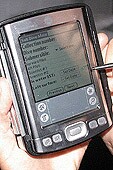
FRIDAY, April 2 (HealthDay News) — Medical misinformation can spread quickly on Twitter, although social networks also offer the potential for sharing vital and correct health information, a new study shows.
Researchers from Columbia University and MixedInk in New York City identified more than 52,000 Twitter updates — called “tweets” — that mentioned antibiotics during a four-and-a-half month period in 2009.
Of those, about 700 tweets included incorrect information about antibiotics, including misunderstandings and bad advice about how they should be used or evidence of misuse. Examples included: “Well, looks like I have strep throat. Anyone have some extra antibiotics I could snag?” and “If I need to share my remaining antibiotics, I will.”
Other tweets discussed taking antibiotics for viral illnesses such as the cold or flu, even though antibiotics fight bacterial, not viral, infections, said study author Daniel Scanfeld, a doctoral student in computational biology at Columbia University. Other tweets were offers to share leftover pills with friends who might need them, a practice doctors discourage because of the growing threat of antibiotic-resistant bacteria strains. Still other Twitter users discussed that they were going to stop taking antibiotics before the full course because they felt better, another practice that can increase the risk of drug-resistant strains.
“Twitter is an emerging area where people are going to have to make decisions about who to trust,” Scanfeld said. “My advice is to take all the information with a grain of salt, and get a second opinion from a doctor about what you should be doing.”
The study is published in the April issue of the American Journal of Infection Control.
To some degree, discussing Internet-based information with their doctors seems to be just what people are doing, said Bradford Hesse, chief of the Health Communication and Informatics Research Branch at the U.S. National Cancer Institute.
While social networking sites, and the Internet in general, are making more health information available to the public than ever before, the “data smog” is making people more likely to turn to doctors for help with medical decisions, according to a survey in the March 4 issue of the New England Journal of Medicine.
Even as more people research their conditions or seek out opinions about medications and treatment on the Internet, trust in the information has dropped, said Hesse, one of the NEJM study authors. “People are getting a little more cynical and a little more savvy about it.”
At the same time, trust in physicians has risen, Hesse said. People are taking what they learned on the Internet with them to their doctors, looking to trained experts to help them interpret what they’re reading.
“The Internet is not going to replace doctors, and we are not going to replace people with credible information,” Hesse said. “Even though people rely on these technologies more than ever, they are also more frustrated with these technologies.”
Launched in July 2006, Twitter is a social networking and micro-blogging service that enables users to post updates of up to 140 characters either on the Web, instant message or text message via mobile phone, according to background information in the article.
Much of what is on Twitter is excruciatingly mundane, such as this example from the study: “Got more antibiotics from doc. Hope these ones finally get rid of this cough.”
But Twitter has been used for more serious purposes, including by NASA to update the status of space shuttle flights.
Twitter reached 1 billion tweets in November 2008. It had an estimated 44.5 million visitors as of June 2008 with a median age of 31 years, according to the study.
Although Twitter and other social networks certainly increase the chances of incorrect information to spread far and wide, some good may yet come of it, said Michael Gilbert, a senior fellow at the Annenberg Center for the Digital Future at the University of Southern California.
Doctors and public health officials can also use the Internet to correct those mistakes by disseminating the right information.
“People have always talked to each other and misinformed each other about medicine,” Gilbert said. “Now, because of Twitter and other social networks, we can listen in on those conversations. Health authorities can and should be monitoring Twitter to see what people are saying about these things, and correct things, particularly if it’s dangerous.”
More information
The U.S. National Library of Medicine has a tutorial on evaluating health information found on the Internet.

